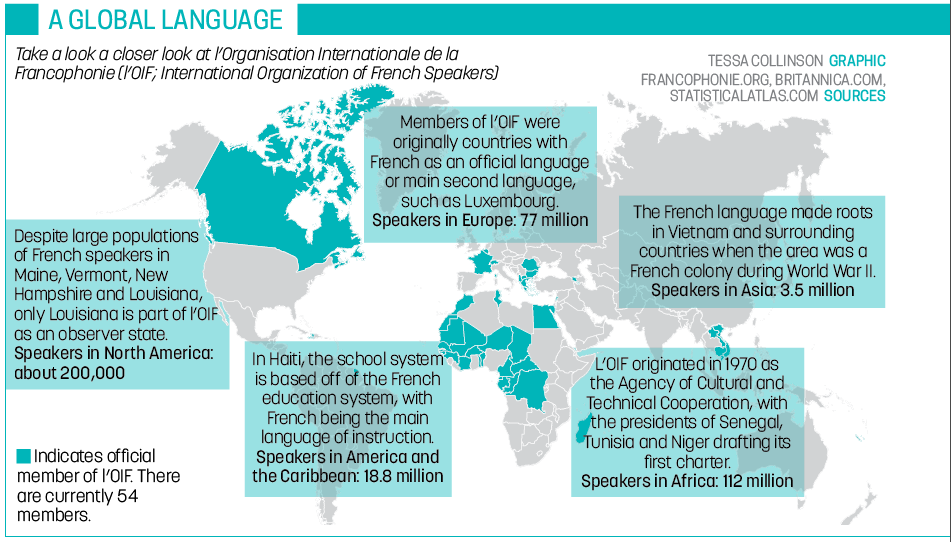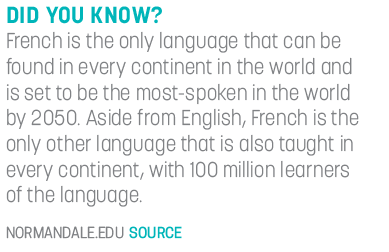While french is only one of the many world languages offered at this school, the concept of the francophone world, which educators teach to French students here, poses an impactful statement on international cultural influence. Francophonie encompasses more than justthe language spoken in France itself and includes people, organizations and governments—both in and outside of France—that use French on a daily basis.

Zach Beeler, AP French student and senior, said, “French is pretty widespread throughout the world, and specifically with African countries; (those African countries) used to be formal colonies of France, so they still are connected by this language. Dialects are different, and accents have kind of changed over time, but in general, they are all pretty connected in the francophone world.”
The widespread phenomenon of Francophonie is accompanied by its own international organization—The Organization Internationale De La Francophonie (La Francophonie)—to represent all of the French-speaking nations.
Andrea Yocum, French teacher and world language department chairperson, described “La Francophonie” as the process where the French government has pushed to say, it wants to ensure the influence of France is evident throughout the world economically, culturally and socially.
Yocum said, “You’re able to use French around the world, and what I think is really interesting is that they celebrate the diversity of the different cultures. You’re able to travel close to 40 different countries with a huge variety that are more or less economically developed, and so to me. I think the diversity (of French) is a strength.”
Because of the 40 different countries French culture occupies, the different celebrations diffuse. For example Mardi Gras, which will occur on March 5, is celebrated not only by French speakers, but by people of many cultures around the world.
In addition to this, Beeler said some French words have completely different meanings in different countries; therefore, the language varies from Quebec to Senegal to France. In fact, there are also two different forms of speaking in France alone.

Marly Ginn, French III student and sophomore, said each country has its own forms of slang that French speakers must adapt to. In addition, Ginn said French countries celebrate shared holidays with other languages, for example, the aforementioned Mardi Gras, Three Kings Day or Noel (Christmas).While these countries speak varied forms of the French language Ginn said, “I think the cultures (between the Frenchspeaking countries) change, but it’s an overall idea that carries over.”
The Francophonie culture is not dying out; according to Yocum, experts expect for French to grow more than any other language in the next 20 years because of the African countries where the language is spoken.
Yocum said, “I think that no matter what a person likes—whether it’s beaches, fashion or music—there is something for everybody with French culture, and I think it’s the ties that bind a common thread.”

Beeler said, “I think the fact that Mardi Gras has spread through so many different cultures is just an example of the importance of French because although it used to just be a celebration in one city, it’s now an integral part of several cultures and that is a prime example of the effect French has on the world.”




























![Keep the New Gloves: Fighter Safety Is Non-Negotiable [opinion]](https://hilite.org/wp-content/uploads/2024/12/ufcglovescolumncover-1200x471.png)
















































![Review: “We Live in Time” leaves you wanting more [MUSE]](https://hilite.org/wp-content/uploads/2024/12/IMG_6358.jpg)
![Review: The premise of "Culinary Class Wars" is refreshingly unique and deserving of more attention [MUSE]](https://hilite.org/wp-content/uploads/2024/12/MUSE-class-wars-cover-2.png)
![Introducing: "The Muses Who Stole Christmas," a collection of reviews for you to follow through winter [MUSE]](https://hilite.org/wp-content/uploads/2024/12/winter-muse-4.gif)
![Review: "Meet Me Next Christmas" is a cheesy and predictable watch, but it was worth every minute [MUSE]](https://hilite.org/wp-content/uploads/2024/11/AAAAQVfRG2gwEuLhXTGm3856HuX2MTNs31Ok7fGgIVCoZbyeugVs1F4DZs-DgP0XadTDrnXHlbQo4DerjRXand9H1JKPM06cENmLl2RsINud2DMqIHzpXFS2n4zOkL3dr5m5i0nIVb3Cu3ataT_W2zGeDAJNd_E-1200x884.jpg)
![Review: "Gilmore Girls", the perfect fall show [MUSE]](https://hilite.org/wp-content/uploads/2024/11/gilmore-girls.png)
![Review in Print: Maripaz Villar brings a delightfully unique style to the world of WEBTOON [MUSE]](https://hilite.org/wp-content/uploads/2023/12/maripazcover-1200x960.jpg)
![Review: “The Sword of Kaigen” is a masterpiece [MUSE]](https://hilite.org/wp-content/uploads/2023/11/Screenshot-2023-11-26-201051.png)
![Review: Gateron Oil Kings, great linear switches, okay price [MUSE]](https://hilite.org/wp-content/uploads/2023/11/Screenshot-2023-11-26-200553.png)
![Review: “A Haunting in Venice” is a significant improvement from other Agatha Christie adaptations [MUSE]](https://hilite.org/wp-content/uploads/2023/11/e7ee2938a6d422669771bce6d8088521.jpg)
![Review: A Thanksgiving story from elementary school, still just as interesting [MUSE]](https://hilite.org/wp-content/uploads/2023/11/Screenshot-2023-11-26-195514-987x1200.png)
![Review: "When I Fly Towards You", cute, uplifting youth drama [MUSE]](https://hilite.org/wp-content/uploads/2023/09/When-I-Fly-Towards-You-Chinese-drama.png)
![Postcards from Muse: Hawaii Travel Diary [MUSE]](https://hilite.org/wp-content/uploads/2023/09/My-project-1-1200x1200.jpg)
![Review: "Ladybug & Cat Noir: The Movie," departure from original show [MUSE]](https://hilite.org/wp-content/uploads/2023/09/Ladybug__Cat_Noir_-_The_Movie_poster.jpg)
![Review in Print: "Hidden Love" is the cute, uplifting drama everyone needs [MUSE]](https://hilite.org/wp-content/uploads/2023/09/hiddenlovecover-e1693597208225-1030x1200.png)
![Review in Print: "Heartstopper" is the heartwarming queer romance we all need [MUSE]](https://hilite.org/wp-content/uploads/2023/08/museheartstoppercover-1200x654.png)





